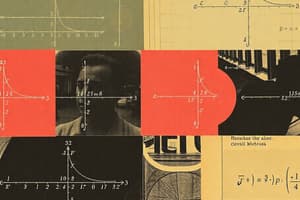Podcast
Questions and Answers
What does the term 'algebra' root from?
What does the term 'algebra' root from?
alogein
What are algebraic expressions built from?
What are algebraic expressions built from?
coefficients, variables, and constants
What are fixed numbers that don't change called in algebra?
What are fixed numbers that don't change called in algebra?
constants
What do letters like A, B, C, x, y, z represent in algebra?
What do letters like A, B, C, x, y, z represent in algebra?
Signup and view all the answers
What do linear equations connect using the equal sign?
What do linear equations connect using the equal sign?
Signup and view all the answers
What does linear algebra focus on?
What does linear algebra focus on?
Signup and view all the answers
What are algebraic expressions composed of?
What are algebraic expressions composed of?
Signup and view all the answers
Provide an example of an algebraic expression.
Provide an example of an algebraic expression.
Signup and view all the answers
What are algebraic identities, and why are they important?
What are algebraic identities, and why are they important?
Signup and view all the answers
How can linear equations be solved?
How can linear equations be solved?
Signup and view all the answers
What methods can be used to solve quadratic equations?
What methods can be used to solve quadratic equations?
Signup and view all the answers
In what fields are algebraic applications evident?
In what fields are algebraic applications evident?
Signup and view all the answers
Study Notes
Mathematics: Exploring the World of Algebra
Algebra, a cornerstone of mathematics, is a subject that brings order and clarity to the world of numerical and symbolic expressions. This fascinating realm has been pivotal in shaping our understanding of the universe and enriching our problem-solving abilities.
Algebra is rooted in the Greek term "alogein," meaning to uncover or reveal. In this context, it refers to the process of exposing the relationships between variables within mathematical equations and expressions. Algebraic expressions are built from coefficients, variables, and constants, and they allow us to represent and manipulate quantities that can change or are unknown.
The Language of Algebra
Algebra unites multiple branches of mathematics, utilizing a universal language that consists of symbols, variables, and operations.
- Variables: Letters like A, B, C, and x, y, z represent unknown or changing values in an equation.
- Constants: These are fixed numbers that don't change, such as 3 or -5.
- Coefficients: Numerical quantities that are multiplied by variables, such as 2x or -3y.
- Equations: Statements that connect variables and constants using the equal sign, such as x + 3 = 5 or 2y - 1 = 7.
Linear Algebra
Linear algebra, a subfield of algebra, focuses on linear equations and their properties. This field is essential for understanding and manipulating matrices, vectors, and systems of equations. Linear algebra has applications in various fields, including computer science, engineering, and social sciences.
Algebraic Expressions and Identities
Algebraic expressions are built from variables, constants, and operations. Examples include:
- 3x + 2
- 5y² - 7
- (x + 1)(x - 3)
Algebraic identities, like the distributive property, the order of operations, and the properties of exponents, provide rules for simplifying and manipulating expressions. These identities are fundamental to solving equations and understanding more complex topics.
Solving Equations
There are various methods for solving equations, including the following:
- Simplifying and solving linear equations: Solve for the variable in equations such as x + 2 = 5 by isolating the variable.
- Solving quadratic equations: Solve for the variable in equations of the form ax² + bx + c = 0 using the quadratic formula or factoring.
- Solving systems of linear equations: Find the solution to a set of linear equations with two or more variables by using graphical methods, substitution, or elimination.
Applications of Algebra
Algebra is a widely applicable field, with examples of its use being evident in everyday life:
- Business and Economics: Algebraic models are used to predict financial trends, calculate interest rates, and analyze market dynamics.
- Physics: Algebraic expressions and equations are used to describe the behavior of physical systems, such as motion and energy.
- Chemistry: Algebra is used to calculate molarity, stoichiometry, and equilibrium constants.
- Engineering: Algebraic equations are used to model and solve problems related to structures, circuits, and materials.
Algebra is a fascinating field with endless opportunities for exploration and discovery. As you delve deeper, you'll find that algebraic concepts and problem-solving skills are valuable tools that enrich your understanding of the world. Remember, the beauty and power of algebra lie in its simplicity and elegance, providing a universal language for solving problems and answering complex questions.
Studying That Suits You
Use AI to generate personalized quizzes and flashcards to suit your learning preferences.
Description
Discover the fundamental concepts of algebra, from variables and equations to algebraic expressions and identities. Learn about linear algebra, methods for solving equations, and real-world applications of algebra in various fields.




